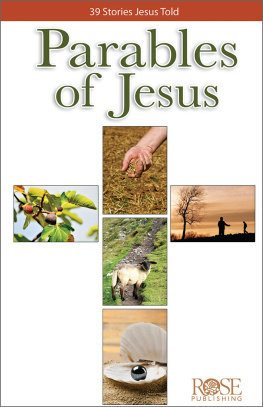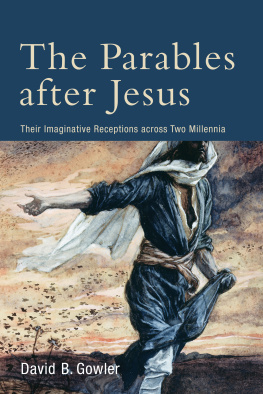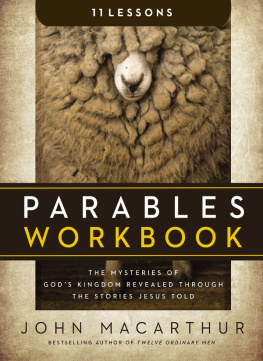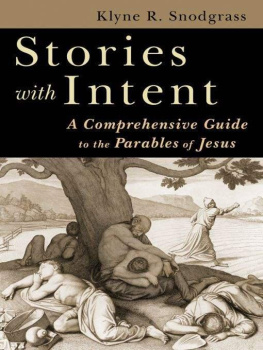MICHELLE LEE-BARNEWALL
SURPRISED BY THE PARABLES
GROWING IN GRACE THROUGH THE STORIES OF JESUS


Transformed by the Parables of Jesus: Growing in Grace through His Stories of Surprise
Copyright 2020 Michelle Lee-Barnewall
Lexham Press, 1313 Commercial St., Bellingham, WA 98225
LexhamPress.com
All rights reserved. You may use brief quotations from this resource in presentations, articles, and books. For all other uses, please write Lexham Press for permission.
Email us at .
Unless otherwise noted, Scripture quotations are from the Holy Bible, NEW INTERNATIONAL VERSION. Copyright 1973, 1978, 1984, 2011 by Biblica, Inc. Used by permission. All rights reserved worldwide.
Print ISBN 9781683592990
Digital ISBN 9781683593003
Library of Congress Control Number:2019950882
Lexham Editorial: Derek R. Brown, Sarah Awa
Cover Design: Lydia Dahl
TO RHYS
A PRECIOUS GIFT OF
GODS GRACE.
CONTENTS
This book represents a bit of a departure from my usual writing and research, and so I am very appreciative of the opportunity to pursue the project, first from Jim Weaver, and now from Lexham.
My friends and colleagues June Hetzel and Joanne Jung at Biola University provided support and encouragement especially in the early stages. My teaching assistant, Elaina Cray, read the entire manuscript and offered valuable critiques and suggestions.
For all writers and researchers, time is a most valuable commodity. A seventh-semester research leave from Biola gave me the time to complete the manuscript. Much-needed funding for the leave came from a Biola research and development grant and a grant from the Biola biblical and theological studies division.
My editor at Lexham, Derek Brown, kindly and enthusiastically guided me through the process and gave helpful feedback. I am grateful to him and everyone else at Lexham who has helped this project see the light of day.
And as always, I am very thankful for a patient and supportive husband who constantly encourages me to share my thoughts and write what I believe.
One of my all-time favorite stories is O. Henrys The Gift of the Magi. Set in the early 1900s, it tells the story of Della and Jim, a young couple who want to buy Christmas presents for each other, but have very little money. They do have two prized possessions: Jims gold watch, which had belonged to his father and grandfather, and Dellas long beautiful hair. Determined to give Jim something special, Della sells her hair in order to buy a platinum fob chain for the watch that he loves so much. She excitedly anticipates giving Jim his present, although with some concern about what he will think about what she has done with her hair.
The twist in the story is that Jim has just sold his watch in order to buy expensive jeweled combs for her hair, combs that she had so much wanted. Ironically, they each sold their most precious possession for the sake of the other person, who could no longer use the gift because they had also sacrificed their most prized belonging. Henry ends the story by explaining that the magi were wise men who brought gifts to the infant Jesus and that Della and Jim were similarly wise in their sacrificial gifts to each other. They chose selfless love as ultimately what was most valuable.
The Gift of the Magi is an example of a parable, which is often defined as a story used to illustrate a moral or spiritual lesson. The Gospels contain numerous parables, in which Jesus teaches about the kingdom of God and life in the kingdom. However, parables are also some of the most powerful means of spiritual formation, since they were intended not just to teach a lesson but also to confront and challenge the audience. Because of this, parables are uniquely suited to open our hearts to Jesus transformative teaching and should be readand experiencedin this way.
WHAT IS A PARABLE?
We generally think of parables as the stories that Jesus told. Our English word parable is the translation of both the Hebrew term mashal and the Greek term parabol . In the New Testament, parables can also include similes (Matt 10:16, I am sending you out like sheep among wolves. Therefore be as shrewd as snakes and as innocent as doves) and metaphors (John 10:7, I am the gate for the sheep). In the Old Testament, mashal can refer to proverbs (Prov 1:1), riddles (Ezek 17:2), and prophecies (Num 23:7).
In this book we will focus on the parables that are stories. While all the parables give us glimpses into the kingdom of God, there is something that is particularly powerful about stories. In the story parables we see best how Jesus teaching causes people to come to the point where they must decide whether their hearts will be open or closed to Jesus and the kingdom. The parables we will examine in this study focus on different aspects of Jesus invitation to follow him in the hopes of challenging us to a more holistic understanding of what it means to be his disciple.
One critical item to remember in reading the parables is that they teach by transferring truth. This transference may be based on common knowledge. For example, when Jesus says, The kingdom of heaven is like yeast that a woman took and mixed into about sixty pounds of flour until it worked all through the dough (Matt 13:33), one can apply ones knowledge of bread making and properties of yeast to understand his point.
Story parables transfer truth through a focus on specific people and their actions. So we evaluate the interaction of the judge with the widow in Luke 18:18. We consider the actions of the man who had two sons in the parable of the prodigal son (Luke 15:1131). We follow the activity of the good Samaritan (Luke 10:2537).
It is important to know that this transference is grounded in reality. This means historical context is critical to understanding the parables. Why does it matter that the hero in the parable of the good Samaritan is specifically a Samaritan? Why is it significant that the prodigal son asks not simply for money but for the inheritance? Is the friend who comes to the door in the middle of the night asking for food being rude or acting according to cultural convention? How should we expect the owner of the vineyard to act toward his workers? Sometimes parables make their point through exaggeration, but even then, the exaggerations emphasize the point based on the essential reality.
In parables, we try to identify what are called the points of reference. We look for areas that people would immediately identify with when they heard it. We need to know not just that two people passed by the man attacked by the robbers, but also that the two were a priest and a Levite. We understand the father in the story as a typical Jewish father and the sons as having normal filial obligations. By knowing the points of reference, we can identify the unexpected turn in the story. The points of reference set up expectations, and the unexpected turn creates a surprise, which is the deeper lesson of the parable, as Jesus confronts prejudices, brings about conviction, exposes hardness of heart, and so forth.
In many ways, parables are like jokes because they are not supposed to be interpreted as much as they are to be experienced. Jesus audience would have known the points of reference, and so they would have gotten the point, or the twist, because they would instantly recognize what he was implying and when the story took an unexpected turn. They would have been in on the joke, so to speak. While we may not be able to relate to the story in the same immediate way as Jesus audience, a greater knowledge of the points of reference moves us closer to hearing and experiencing the parables as they would have.















